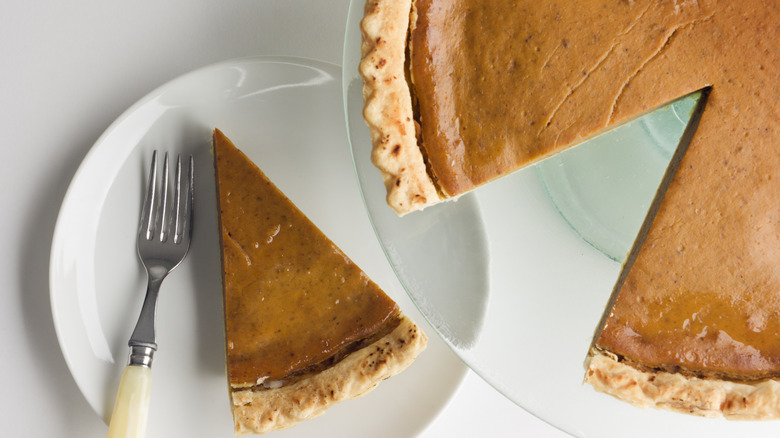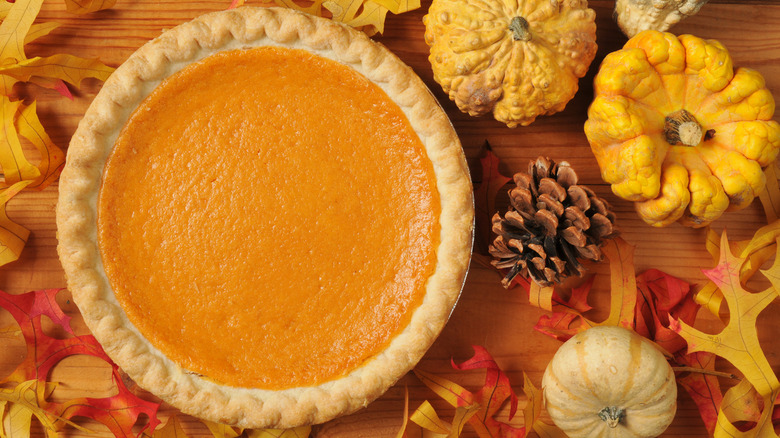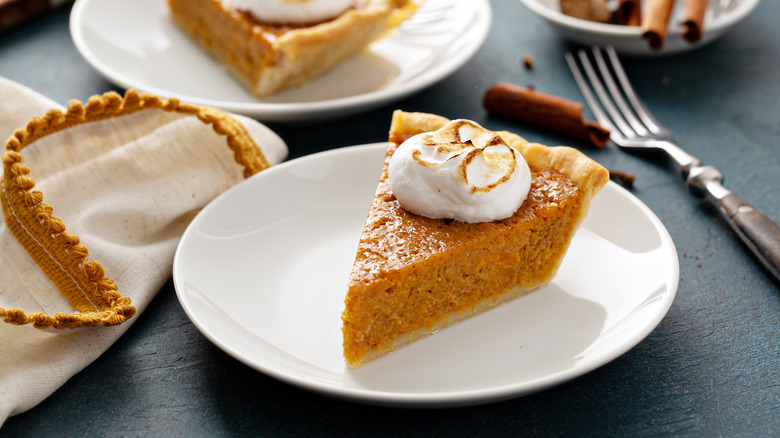The Easy Tip For Adding Layers Of Flavor To Your Pumpkin Pie
Ready for the holidays, but want something a little more from your average pumpkin pie? From mascarpone, chocolate chips, maple syrup, and even tofu, there are tons of unconventional ingredients you can toss in to seriously upgrade your pumpkin pie. But if you're looking to get something a little more complex without getting too over-the-top, you're in luck. All it takes to add layers of autumn-soaked flavor and take a basic, no-frills, traditional pumpkin pie to the next level is to swap out some of the pumpkin with other fall-appropriate gourds and root veggies.
Squash, sweet potatoes, and yams are what you're looking for to add a little oomph to the taste and texture. These unconventional substitutions are sweet, creamy, earthy, and just perfect for elevating a pumpkin pie without changing the flavor too much. In fact, they might even bring the results even closer to your ideal of what a pumpkin pie should look and taste like because — let's be honest — a basic pumpkin pie made with real orange jack-o-lantern pumpkins never actually lives up to the seasonal hype.
The best pumpkin pie is actually made with varieties of squash
The harsh truth is that carving pumpkins make the worst pumpkin pie. It's watery, stringy, not all that sweet, and produces a filling that's nothing like the creamy and buttery purée you'd get out of a store-bought can. The reason behind this isn't some extra unlabeled additive to make it taste better — it's just that canned pumpkin purée isn't actually made from orange carving pumpkins. They're made from specially cultivated varieties of pumpkin that are more closely related to popular types of sweet squash. Libby's and Ed Smith in particular use the Dickinson Pumpkin, which is an heirloom variety of the winter squash.
Here's where things get a little tricky. There is no real scientific or anatomical difference between squashes and pumpkins. It's more or less a purely linguistic distinction, and you'll find all kinds of pumpkins and squash listed under the various cultivars of Cucurbitaceae, i.e. the gourd family. When it comes down to it, many squashes that are popular for making creamy soups will also taste excellent in a pumpkin pie without making it taste any less like what you'd expect pumpkin to taste like. Mix in some honeynut, butternut, kabocha, and/or another one of your favorite squashes with a can of pumpkin purée, and you'll find yourself with an intricately layered autumn flavor profile in your pumpkin pie that you won't be forgetting anytime soon.
Add in sweet potatoes or yams for some bonus complexity
A pumpkin pie made with mostly squash can arguably still be called a 100% pumpkin pie — but if you don't mind going a step further into unconventionality, it's time to add a few sweet potatoes into the mix. With an incredibly subtle taste, natural sweetness, and creamy texture, these root vegetables are the ultimate key to adding a heavenly mouthfeel without distracting or taking away from the main pumpkin flavor. Ideally, you'd be going for the classic orange-fleshed sweet potatoes. If you aren't too picky about getting a slightly paler pie filling, you can try out even sweeter and creamier varieties like the Korean Goguma for a decadently sweet and smooth pie that's guaranteed to wow your holiday guests.
Ironically, picking between sweet potatoes and yams for your pie has the opposite problem of pumpkins vs. squash. Sweet potatoes and yams have origins and properties that make them scientifically and botanically distinct. The complicated part is that most of the veggies you know as yams are probably just varieties of sweet potato — the two terms are used somewhat interchangeably and have gotten incorrectly assigned in multiple cases. So if you're worried about whether yams or sweet potatoes would be better in a pumpkin pie, don't sweat it: Yams may be terrible for pie because of its much starchier nature, but true yams like ube are hard to find outside of specialty grocery stores. If your favorite yam doesn't look or feel terribly different from the average sweet potato, it's most likely a sweet potato, and will perform just fine in a pumpkin pie.


